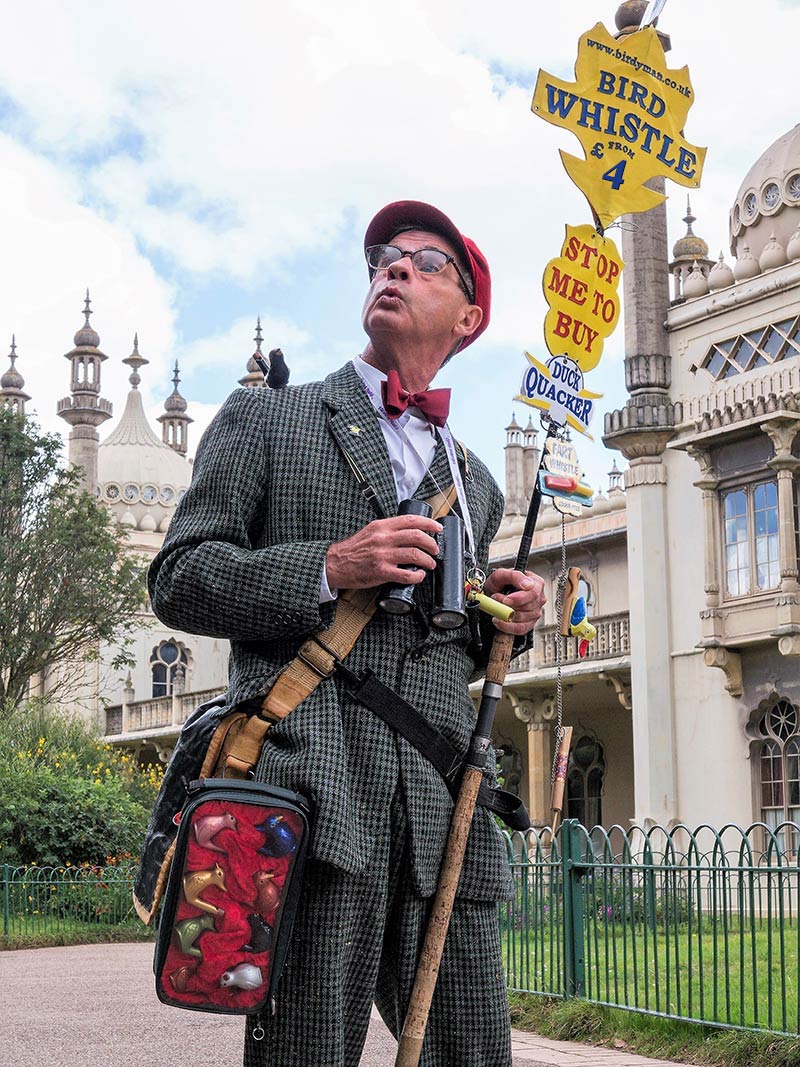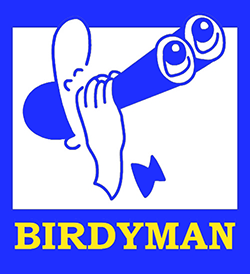A COFFEE WITH TIM BAT
‘BIRDYMAN’
Tim Bat walked into town from Queens Park, his pockets filled with some of the bird whistles he’d spent his last £200 on, going out to sell them for the first time. He felt “apprehensive”. He needed the money.
This was early 2009. He’d been a performer since the 70’s, and had risen to a point where he’d been doing quite lucrative corporate gigs, as well as children’s shows at theatres. But both the corporate event scene and grant-dependent theatres had been hit by the financial crisis. And he’d had such a good year in 2007 that he now faced a “massive tax bill”.
Having spent so long as a performer, “living off my wits and creativity”, he didn’t want to take a salaried job. He’d discovered the bird whistle in 1980, used it intermittently in his act, and had toyed with the idea of selling them. “I just woke up one day and thought: ‘Go for it …’”
Tim meets me at the Pavilion Gardens Cafe, where he lets his coffee get cold, speaking almost uninterrupted for 90 minutes with no obvious loss of enthusiasm. A natural showman, he likes waving his hands about and pulling faces for emphasis. He doesn’t seem particularly eccentric. ‘Birdyman’ is a character he plays.
*See the film Trickster on YouTube here

Birdyman at The Royal Pavilion Brighton
Photo by Tony Tree
“I really like existing in this imagined space. People sort of imagine who you are, some weird guy, and they spin out their own stories, in their heads. You enter people’s imagination, which is also what I do when I perform, particularly in my children’s show. All I’ve done with Birdyman, I’ve broadened that way out to encompass everybody who happens to be around, not just an audience.”
Tim came to Brighton in 1973, to study Fine Art. He became interested in “semiotics and semantics, the relationship between words and images,” but also “sort of embraced triviality. Because I was doing quite light-hearted stuff.” Once, he put a “loud ticking device” in his locker, as a kind of art installation. Another time, he posted a detailed timetable next to the college’s lift, according to which, it would arrive every 30 seconds.
After college, Tim worked for Brighton Council as a “general Corporation dogsbody” – dustman, beach cleaner, leaf sweeper, litter bin surveyor, municipal tip pest controller. He got into juggling, but was too nervous to do it in public in the UK. Instead he performed in Barcelona with a mandolin player, but this was just after Franco and political tensions meant that, whenever they got a crowd, the Guardia Civil would break it up and threaten to arrest him.
Back in the UK, he worked as a juggler, a jester, a robot operator, and as a busker at Covent Garden. He developed a stage show, and a line in corporate entertainment, and was “really quite successful, travelling far and wide and doing prestigious jobs for lots of money, sometimes”. Working as a pedlar seemed a bit of a come-down but after doing it for a bit, “I started getting into it, being this character. There was a creativity, an aspect of it that re-sparked the stuff I was doing in art college, in a way. I started regarding it as a piece of artwork. And then, of course, ideas started coming about little jokes I could do, little mini-performance type things; the outfit, the mode of presenting it, the sign.” For example he has a gag where he coughs up feathers, another one with binoculars that split in half, and he whistles the Chariots of Fire theme at joggers on the seafront.
“I’m constantly working on how to make it funny, and I do, I make people laugh with a few minimal little visual jokes.” Of course, he accepts that some people find it annoying, and sometimes tells himself he doesn’t care, “but this is my defence mechanism”. He does care, and tries to avoid situations where he might annoy people.
What do his family think of it? “Of Birdyman? My wife’s in two minds, but I’ve been a street performer since we met, 35 years ago, so she’s not surprised that things have taken this turn. The thing is, I think it’s a pretty good-quality piece of work, so I’ve got conviction in it, and I project it with pride. That’s why I walk around with a little bit of a swagger; I know what I’m doing artistically. There’s something about it, and my wife gets it, so that’s fine. And it helps with our finances.”
Interview with Steve Ramsey, VIVA BRIGHTON magazine, July 2015
